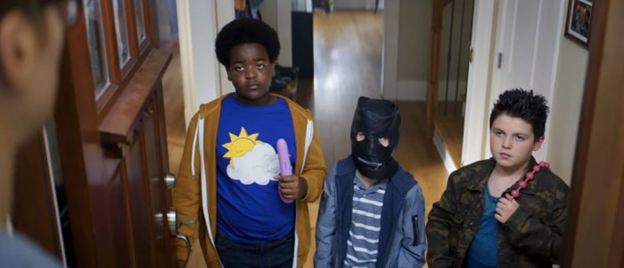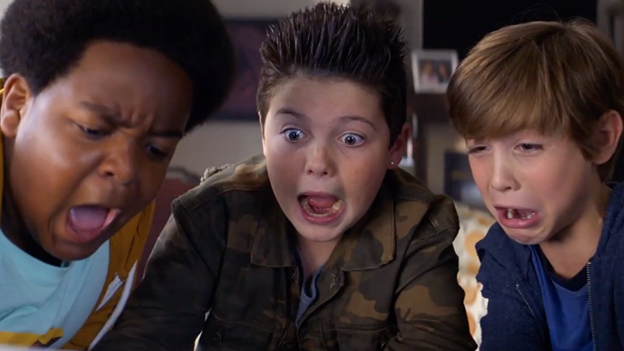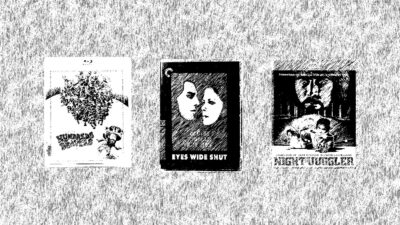The studio comedy has been losing its way for a while now. One can arguably trace it back to Paul Feig’s runaway hit BRIDESMAIDS, which ushered in a new filmic language chiefly by erasing it. What had been standard practice in comedies (i.e. visual gags) has been replaced namely by tired improvisation uniformly shot in closeup. GOOD BOYS doesn’t really have the luxury (read: convenience) of relying on improv since its stars are tweens and generally new to this whole moving picture business. What GOOD BOYS has in abundance, something it shares with its comedic progenitor, is crudeness. Those who criticize the film solely for its slavish devotion to crude sexual gags and reliance on profanity, though, are missing the forest for the trees; what’s most concerning about Good Boys is the way its filmmakers reserve malice exclusively for women, and its penchant for avoiding like the plague confrontations with objective reality.
The premise is intuitive enough: a trio of tween lads gets caught up in a maelstrom of a father’s shattered drone, recreational drugs, and kissing parties. After a promising opening scene, which dives headfirst into the awkwardness of emergent adolescent sexuality and its butting heads with parental obligation, there’s not much to celebrate—beyond the committed performances of its young cast, at least two of which show great promise. The movie quickly becomes a dirge through f-words and general idiocy, with no wit or visual ingenuity to spare.

These boys don’t look good at all!!
The boys are chastised for their juvenile antics—namely, drone-spying on two high school girls as an attempt to learn proper kissing technique—as the girls avow solemnly, “this is what happens when you don’t respect women.” Similar straw men are deployed throughout the film: the boys miscomprehend the denotation of “feminism” (like totally normally-functioning, conscious 6th graders) and much is made of consent when it relates to sexual advances. The boys’ reconnaissance mission is not sexist in its own right; rather, a misguided tactic to further their advancement as sexual beings.
What is sexist, indeed misogynist, is the screenwriters’ wrath toward consent as a concept, which appears to disgust them to an inordinate degree. Consent, in the filmmakers’ eyes, is an SJW mechanism whereby romance is reduced to mood-killing queries, a contraption which necessarily involves the gutting of chivalry, an ideology that must assume some level of ambiguity. Feminism is an obstacle to sex, an erection-prohibitor. You can almost hear the screenwriters rail against it in no uncertain terms in their Netflix specials.

“Boss man, I got an idea. It’s called ‘Good Boys.’ But the twist is, they ain’t good boys!”
Thor’s musical theater proclivities are regarded in equally nonsensical terms. Sure, he’s derided as a “bitch” by the macho scooter kids for his love of singing, but any movie which wished to be intellectually honest would’ve substituted the nondescript “bitch” with the unambigious “faggot.” The setting of Good Boys reads liberal Southern California, where upper middle-classness is equated to liberalism and tolerance (a distinctly classist notion). I suspect the filmmakers chose the setting as a way to avoid confrontation with slurs which almost surely would be leveled against Thor in another part of the U.S. That isn’t to say, however, that “faggot” would not be used in a SoCal middle school. Middle school is middle school, as high school is high school, and these words are said—read any statistic. That Good Boys is so comfortable having its titular tweens play around with anal beads and S&M accessories yet shies away from authentic language is deeply troubling.
If anything, having slurs in your script buttresses the humor, allowing an element of pathos which the movie sorely lacks. The film is undoubtedly cowardly—just look at the nonstop barrage of “fuck”s, a clear indicator the filmmakers feel the viewer will lose interest if the boys are treated as real people and not mentally challenged sailors (seriously, these kids are genuine dumbasses). GOOD BOYS lives in a utopia, whereas the real world is shrouded in darkness, school shooter drills and homophobic and racist slurs emblazoned on lockers. The cinema as “escapism” is probably the most loser concept out there, especially when that escapism serves to distract from real political issues, or worse yet—mock them.















Comments